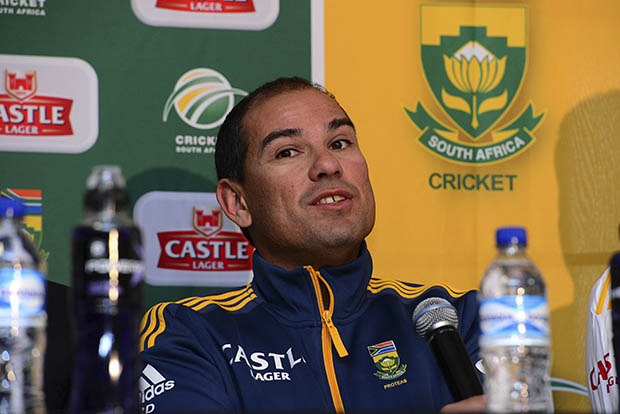Russell Domingo has earned the right to coach the Proteas beyond the 2015 World Cup in Australia.
This past weekend, Cricket South Africa confirmed that Domingo’s contract has been extended to April 2016. What this means is that Domingo will continue to coach the Proteas regardless of how the team fares at the 2015 World Cup in Australia and New Zealand.
It’s a decision that’s bound to spark some debate among the Proteas’ ardent and – let’s face it – long-suffering fans. The ODI and Twenty20I sides are yet to win silverware at a global tournament. Does this recent decision mean that Cricket South Africa is looking for more stability in the long term, or does it mean that the pressure is no longer on the Proteas to capture that elusive ICC trophy?
I would argue that it’s the former. Indeed, it is something that may become commonplace in South African sport in the near future. Perhaps not in football, but certainly in another big code like rugby.
The worst kept secret in South African rugby is that Springbok coach Heyneke Meyer will be offered a contract extension before the 2015 World Cup in England. Meyer’s bosses have bought into his long-term vision for the Boks, and there is a belief that he can bring the country more success in the buildup to the subsequent rugby showpiece in Japan in 2019.
The Boks may have lost to the All Blacks this past Saturday, but Meyer’s tenure has been largely successful. In 2012, he took a team that was ranked No 4 in the world, and turned them into a competitive unit that would finish the season second in the rankings. In 2013, the Boks won 10 of their 12 Tests, their best return in terms of wins since 1998.
Like Meyer, Domingo has given his bosses good reason to believe he is the right man for the present and future. Word from the Proteas camp is that Domingo has the senior players’ backing. That endorsement does count for something, but more can be read into the team’s recent results, and not just in the 50-over format.
The focus may be on next year’s World Cup in Australasia, but what also needs to be considered is the team’s progress as a Test unit. The Proteas Test side made a statement when they beat Sri Lanka in Sri Lanka this past July. There were some great gains in that series, and it should also be noted that the victory was achieved without Graeme Smith and Jacques Kallis, who had both retired earlier in the year. It was a sure sign that the Test side, under Domingo and new captain Hashim Amla, were headed in the right direction.
But that is not to say they are the finished article. The series against Sri Lanka marked the first step in a process, and the matches staged at the end of this year against West Indies will mark the second. Neither Sri Lanka nor the Windies are Test superpowers, but it’s vital that the Proteas continue to grow over the next few months before they meet Australia, England, and India further down the line.
In that respect, it would make no sense to sack Domingo on the basis of the ODI team failing at next year’s World Cup. Indeed, it would seem the Test side has room to improve despite the win in Sri Lanka, and it makes no sense to start the development process from scratch with a new coach.
The ODI side has also taken great strides in recent months, scoring a big win against Sri Lanka in difficult subcontinent conditions, and then knocking over Australasia in the triangular series final in Zimbabwe. They too must improve, especially in the bowling department. The coming ODI matches in New Zealand and Australia will provide a great opportunity to do so.
The decision to extend Domingo’s contract beyond the 2015 World Cup should not be seen as a bad thing. The best is yet to come from this side in all three formats. Backing Domingo to remain in charge for an extended period will give the Proteas a better chance of realising their long and short term goals.







